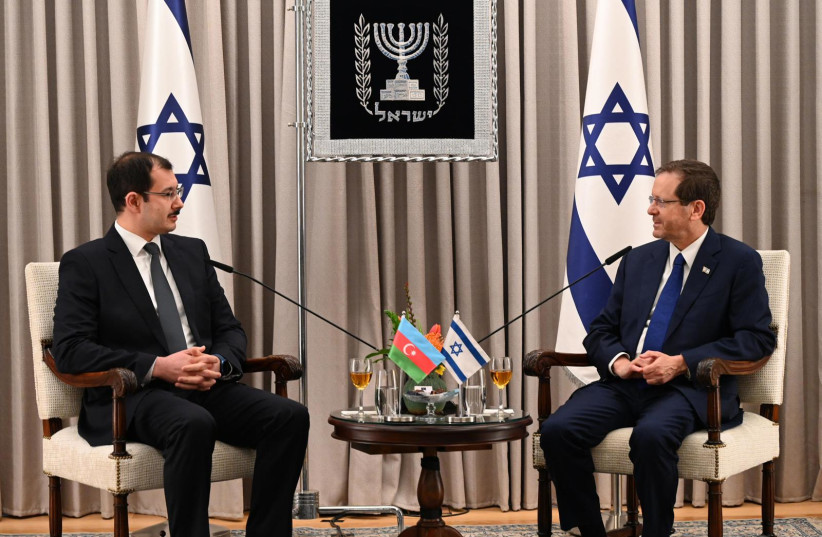In a visit of great strategic importance to Israel, Foreign Minister Eli Cohen this week led a high-level delegation to Azerbaijan.
The visit illustrates the important ties between Baku and Jerusalem, which have been warm for many years. In recent years, however, those ties have increasingly generated high-level visits. Azerbaijan recently took its commitment to the relationship to a new level by opening an embassy in Israel.
Israel views Azerbaijan, a Shi’ite-majority country, as one of its key strategic partners in the region. Strategic partnerships are important for Israel, especially in times of global change. Israel has fostered similar close ties with India. In addition, the Abraham Accords are now almost three years old, and they illustrate how Jewish and Muslim countries can work together on shared interests and also foster coexistence.
Azerbaijan, as a historic partner, was a forerunner of the ties Israel is trying to form with many other countries and also of the improvement in relations with countries such as Turkey.
When Azerbaijan opened an embassy in Israel, Cohen lavished praise on the relationship. “Azerbaijan is a Muslim country, and its strategic location makes the relationship between us of great importance and great potential,” he said at the time. “Israel and Azerbaijan share the same perception of the Iranian threat. The Iranian ayatollah regime threatens both our regions, finances terrorism and destabilizes the entire Middle East.” Cohen also said he would visit Baku and has now made good on that promise.

It is important that the relationship with Baku is centered on building up strong commercial ties. Azerbaijan has already become an important market for Israel’s defense industry. Now is the time to cement our ties on more building blocks. Israel is an innovator in many fields, including cybersecurity, food technology and water issues.
As part of the expanded cooperation, Cohen brought a large delegation representing some 30 Israeli companies specializing in homeland security, cybersecurity, agriculture, water and other technologies.
Cohen’s meetings with Azerbaijan President Ilham Aliyev and Foreign Minister Jeyhun Bayramov are important to the substance and symbolism coming out of Baku today. Baku is hosting Israel at a time of change in the region. Iran-Azerbaijan tensions have grown over the last year as Tehran continues to employ hostile rhetoric against Baku and to slam Israel-Azerbaijan ties.
Growing ties with Israel
At the same time, Azerbaijan faces tensions with Armenia. Russia, which plays a key role in the South Caucasus, is also interested in developments there. Baku’s ties with the West and Israel are thus important for the country’s ability to maneuver independently in the international arena. The ties are important to Jerusalem because they showcase both coexistence and strategic inroads that Israel has made in recent years, which span the Middle East and Central Asia.
Israel’s growing ties abroad are on display in Cohen’s onward travel to Turkmenistan, where he is expected to open an embassy in Ashgabat. Once again, this is a diplomatic achievement and showcases how Israel is putting a spotlight on relations to the east.
Central Asia is also in flux these days because of developments in Afghanistan and growing ties between Iran, China, Russia and Pakistan. Various countries are seeking to build economic links through Central Asia, including China’s Belt and Road Initiative and Iran’s proposal for a north-south economic corridor that could link Russia with the Indian Ocean.
As a peace partner, Israel has much to offer countries in Central Asia and those in the region, such as Azerbaijan. Iran’s rhetoric against Israel will not change, but the trajectory is clear. Israel and many countries are seeking reconciliation and peace. This is in contrast to the tensions between the West and China and the West and Russia. Israel must navigate these complex waters through the kinds of visits that Cohen is conducting this week.
It is said that the enemy of one’s enemy is one’s friend. But Israel’s flourishing ties with a slew of Middle Eastern and Central Asian countries demonstrate that these relationships are underpinned by far more than shared threats. What we see in these growing ties is a sense of shared opportunity and the potential for cooperation that would benefit all parties. We hope to see them expand to additional countries in the near future.
